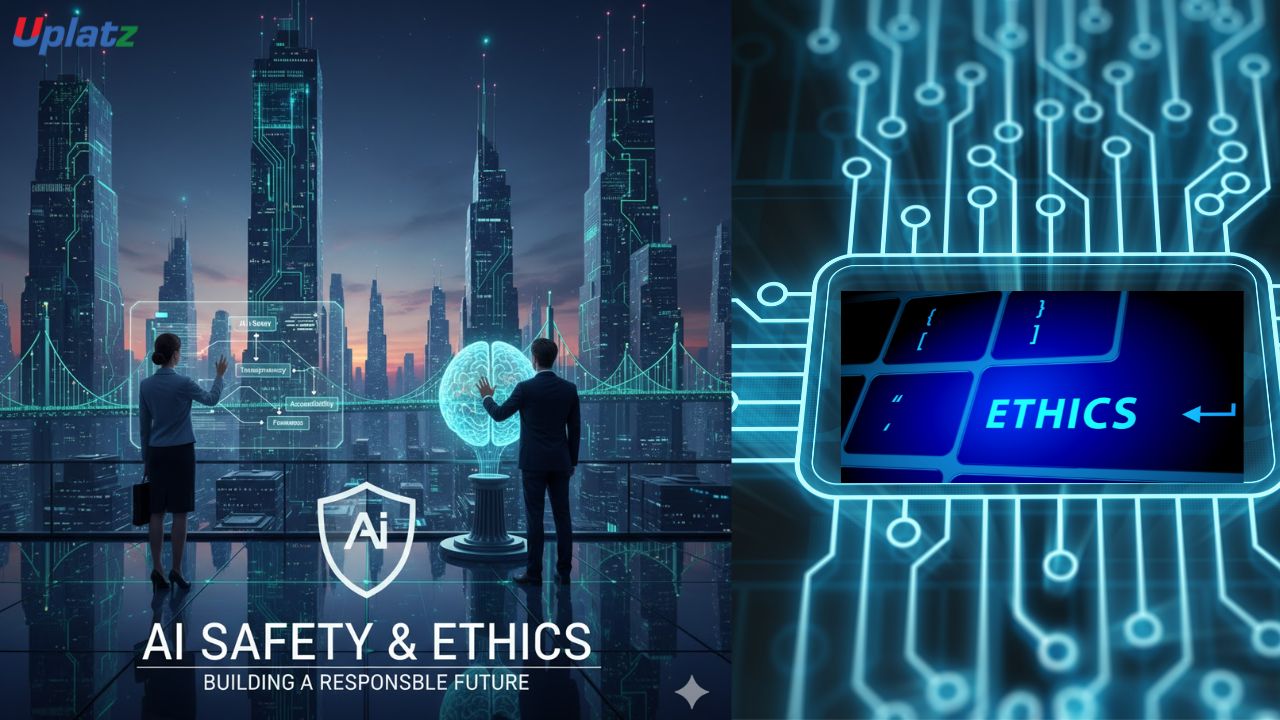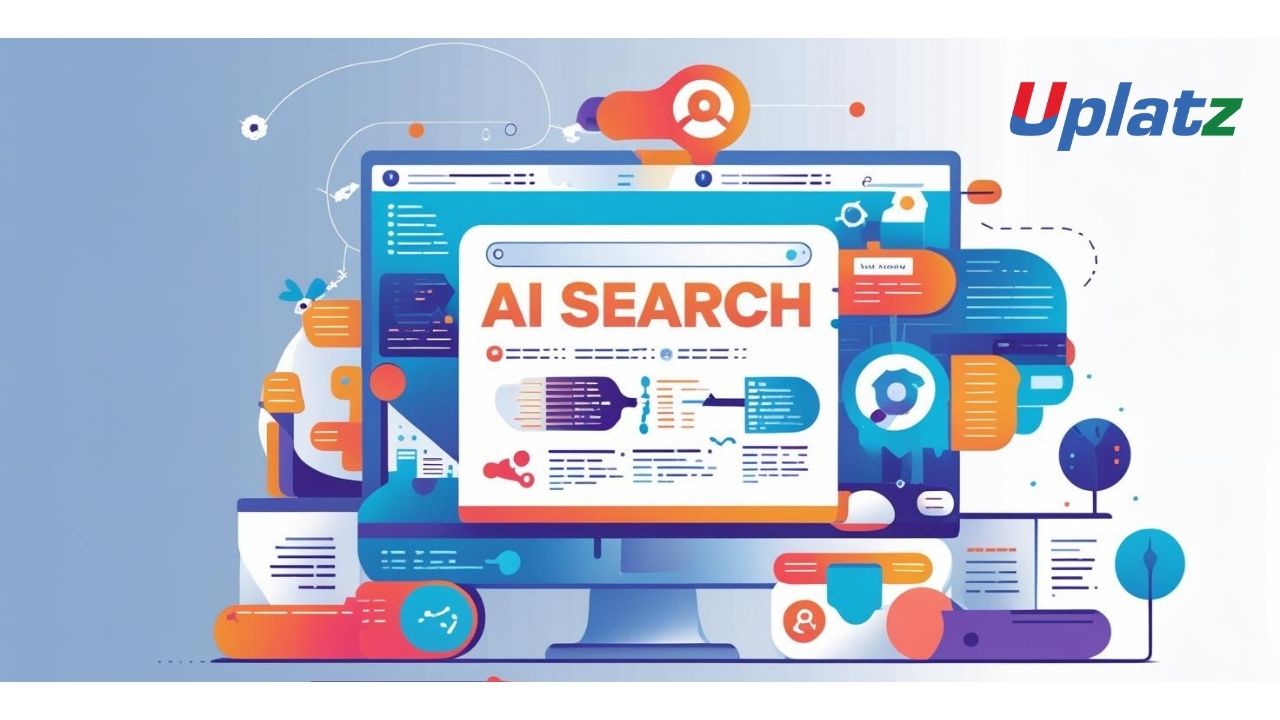AI Safety and Ethics
Learn Responsible AI Principles, Governance, and Risk Mitigation for Real-World AI Systems Price Match Guarantee
Full Lifetime Access
Access on any Device
Technical Support
Secure Checkout
Course Completion Certificate
Price Match Guarantee
Full Lifetime Access
Access on any Device
Technical Support
Secure Checkout
Course Completion Certificate
 97% Started a new career
BUY THIS COURSE (
97% Started a new career
BUY THIS COURSE (GBP 12 GBP 29 )-
 83% Got a pay increase and promotion
83% Got a pay increase and promotion
Students also bought -
-

- AI Search Engines
- 10 Hours
- GBP 12
- 10 Learners
-

- Machine Learning (basic to advanced)
- 65 Hours
- GBP 12
- 4543 Learners
-

- Cybersecurity in a nutshell
- 2 Hours
- GBP 12
- 21 Learners

As artificial intelligence rapidly advances and integrates into critical sectors such as healthcare, transportation, finance, education, and public services, ensuring its safe, ethical, and responsible use has become an urgent global priority. AI systems today have the power to influence life-changing decisions — diagnosing diseases, approving loans, recommending treatments, and making autonomous choices. As these systems become increasingly complex, the risks associated with bias, privacy violations, unsafe behaviors, and lack of accountability intensify.
The AI Safety and Ethics course by Uplatz equips learners with a structured, interdisciplinary understanding of how to design, evaluate, and deploy AI systems responsibly. Through a comprehensive mix of theory, case studies, global regulatory frameworks, and practical tools, this course trains professionals to identify risks, mitigate bias, ensure fairness, and build AI technologies that benefit humanity without causing harm.
This course is ideal for AI developers, data scientists, policymakers, product managers, researchers, and anyone who wants to understand the implications of artificial intelligence in society — and how to shape AI systems aligned with human values.
🔍 What is AI Safety & Ethics?
AI Safety & Ethics refers to the principles, techniques, and governance frameworks that ensure artificial intelligence behaves in ways that are safe, transparent, fair, and accountable. It focuses on preventing harmful outcomes, reducing unintended consequences, and establishing trustworthiness across all stages of the AI lifecycle.
The course covers core pillars of responsible AI, including:
-
Moral philosophy & ethical theories
-
AI risk management and harm reduction
-
Algorithmic fairness & bias analysis
-
Model transparency and explainability
-
Privacy preservation & data governance
-
Human oversight & accountability structures
-
Regulatory compliance and global AI governance
With growing attention from global regulators — including the EU AI Act, OECD AI Principles, UNESCO AI Ethics, and IEEE Ethically Aligned Design — understanding AI ethics is becoming essential for every organization deploying intelligent systems.
Through real-world examples from autonomous vehicles, medical diagnostics, banking risk models, large language models, and facial recognition, this course demonstrates how ethical challenges appear in practice and how they can be responsibly addressed.
⚙️ How AI Safety & Ethics Works in Practice
This course provides a deep, structured understanding of how ethical principles translate into real engineering and governance decisions in AI development.
You will learn:
-
Ethical Foundations
-
Utilitarianism, deontology, virtue ethics, consequentialism
-
Moral reasoning applied to AI decisions
-
Human-centric design philosophies
-
-
Fairness & Bias Detection
-
Types of algorithmic bias (sampling, historical, representation)
-
Fairness metrics (demographic parity, equalized odds)
-
Data auditing and bias mitigation techniques
-
-
Model Interpretability & Transparency
-
Explainable AI tools (LIME, SHAP)
-
Interpreting black-box models
-
Human-in-the-loop decision systems
-
-
Risk Management & Safety Assurance
-
Failure mode analysis
-
Safety vs. accuracy trade-offs
-
Safe reinforcement learning, uncertainty calibration
-
-
Governance & Compliance
-
EU AI Act risk categories
-
OECD trustworthy AI guidelines
-
IEEE governance frameworks
-
Privacy regulations (GDPR, differential privacy, anonymization)
-
-
Accountability & Human Oversight
-
Responsible AI roles & governance structures
-
Audit trails, ethics boards, model monitoring
-
Documentation frameworks (Model Cards, Datasheets for Datasets)
-
The course demonstrates how ethics is not just theoretical — it becomes a practical, measurable part of building AI systems.
🏭 How AI Safety & Ethics Is Applied Across Industries
Companies and governments worldwide are implementing ethical AI practices to ensure safe deployment of intelligent technologies. This course highlights real, industry-specific applications:
-
Healthcare
-
Preventing biased diagnostic models
-
Ensuring safety in clinical decision support
-
Protecting patient data with privacy-preserving AI
-
-
Finance & Banking
-
Avoiding discriminatory credit scoring
-
Ensuring fairness in fraud detection systems
-
Building transparent automated underwriting
-
-
Autonomous Vehicles
-
Collision risk modeling
-
Ethical decision frameworks
-
Fail-safe systems and redundancy
-
-
Public Sector & Law Enforcement
-
Managing bias in facial recognition
-
Ensuring fairness in predictive policing
-
Maintaining civil rights and privacy compliance
-
-
HR & Recruitment
-
Avoiding biased hiring algorithms
-
Ensuring explainability and fairness in screening tools
-
-
E-commerce & Social Media
-
Ethical recommendation systems
-
Managing misinformation
-
Protecting vulnerable user groups
-
Rapid advancements in AI have made responsible AI design a top priority for organizations like Google, Microsoft, IBM, OpenAI, Meta, and global governments.
🌟 Benefits of Learning AI Safety & Ethics
Mastering AI ethics provides substantial individual and organizational value:
-
Future-Proof Skill: Ethical AI specialists are in high demand as regulations tighten globally.
-
Better AI Systems: Build AI models that are transparent, fair, and safe.
-
Regulatory Preparedness: Help organizations comply with the EU AI Act, GDPR, and ISO standards.
-
Risk Reduction: Avoid harmful outcomes, reputational risk, and legal liability.
-
Cross-Disciplinary Insight: Combine technical AI knowledge with ethical reasoning and governance.
-
Career Growth: Opens pathways into AI governance, policy, compliance, and responsible innovation roles.
-
Human-Aligned AI: Ensure that intelligent systems enhance human well-being rather than compromise it.
Ethically trained professionals are becoming essential in AI labs, tech companies, consulting firms, financial institutions, and government agencies.
📘 What You’ll Learn in This Course
This course offers a deep exploration of ethical AI development, including:
-
Foundations of moral philosophy & ethical reasoning
-
AI risk analysis and mitigation strategies
-
Bias detection, fairness metrics & data auditing
-
Explainability and model interpretability techniques
-
Safety principles for machine learning and autonomous systems
-
Global AI governance frameworks (OECD, IEEE, EU, UNESCO)
-
Responsible AI policies & organizational governance
-
Ethical data collection, usage, and privacy practices
-
Human-centered design & accountability mechanisms
-
Best practices for documentation and auditing
-
Case studies from real-world AI failures and successes
You will gain ready-to-use templates, checklists, and audit frameworks suitable for enterprise environments.
🧠 How to Use This Course Effectively
This course encourages active thinking, discussion, and practical engagement:
-
Start with Moral Foundations: Understand ethical theories before applying them to AI.
-
Explore Global Frameworks: Study the EU AI Act, OECD Principles, IEEE guidelines.
-
Participate in Case Studies: Analyze real scenarios involving bias, model failures, privacy breaches.
-
Use Risk Assessment Templates: Apply ethics checklists to sample ML models.
-
Engage in Peer Discussions: Debate trade-offs between innovation and regulation.
-
Complete the Final Project: Design an ethical audit process for an AI system in healthcare, finance, or transportation.
The course emphasizes both critical thinking and practical implementation.
👩💻 Who Should Take This Course
This course is suited for:
-
AI/ML Developers and Data Scientists
-
Product Managers and Tech Leads
-
Policy Makers and Compliance Officers
-
UX/UI Designers working with intelligent systems
-
AI Researchers and Academics
-
Consultants and Risk Analysts
-
Anyone deploying or working with AI technologies
No programming background is required — the course is accessible to both technical and non-technical professionals.
🧩 Course Format & Certification
This self-paced course includes:
-
HD video lessons
-
Case studies and real-world scenarios
-
Interactive discussion prompts
-
Risk assessment templates
-
Ethical audit frameworks
-
Quizzes and checkpoints
-
Lifetime access
-
Uplatz Course Completion Certificate
Learners walk away with both conceptual understanding and practical tools for responsible AI governance.
🚀 Why This Course Stands Out
-
Blends philosophical, technical, and regulatory perspectives
-
Includes real-world case studies from multiple industries
-
Provides practical, reusable templates for AI risk management
-
Covers cutting-edge global governance frameworks
-
Builds both strategic and operational responsible AI skills
-
Prepares learners for roles in AI governance, ethics teams, and compliance
This course goes beyond theory — it provides practical guidance on how to design, evaluate, and deploy AI systems responsibly.
-
Understand the importance of AI ethics and responsible innovation.
-
Explain major ethical frameworks and global AI regulations.
-
Identify sources of bias and unfairness in datasets and models.
-
Apply principles of transparency, accountability, and explainability.
-
Evaluate safety issues in autonomous and adaptive AI systems.
-
Design an AI risk management and auditing process.
-
Analyze real-world cases of AI failures and ethical violations.
-
Explore privacy, surveillance, and data protection concerns.
-
Develop governance frameworks for AI deployment.
-
Prepare for ethical compliance and AI policy roles.
Course Syllabus
Module 1: Introduction to AI Safety and Ethics
Module 2: Moral Philosophy & Responsible Innovation
Module 3: Bias, Fairness, and Social Impact
Module 4: Transparency, Explainability, and Accountability
Module 5: AI Risk Assessment & Governance Frameworks
Module 6: Privacy, Consent, and Data Protection
Module 7: Regulation – EU AI Act, OECD, IEEE, UNESCO Guidelines
Module 8: Ethical Auditing and AI Policy Implementation
Module 9: Case Studies – Healthcare, Finance, Autonomous Vehicles
Module 10: Capstone Project – Designing an AI Ethics Checklist
Upon successful completion, learners receive a Certificate of Completion from Uplatz, validating their understanding of AI Safety and Ethics. This Uplatz certification demonstrates mastery in ethical governance, compliance, and responsible AI strategy.
It aligns with global standards in AI ethics, governance, and policy and prepares learners for roles that require oversight of ethical AI deployment. The certificate is ideal for data scientists, AI engineers, policymakers, and compliance officers seeking to integrate responsible AI practices into their projects or organizational workflows.
Earning this credential highlights your commitment to developing AI systems that are transparent, fair, and aligned with societal values — an increasingly essential qualification in the modern AI landscape.
Ethical AI development is becoming a legal and strategic necessity worldwide. Professionals trained in AI Safety and Ethics are in demand across technology companies, research institutes, and government bodies.
After completing this course with Uplatz, learners can pursue roles such as:
-
AI Ethics Officer / Advisor
-
Responsible AI Engineer
-
Data Governance Specialist
-
AI Policy Consultant
-
AI Risk & Compliance Analyst
Professionals in this field typically earn between $90,000 and $160,000 per year, depending on specialization and geography.
Career growth opportunities lie in regulatory compliance, AI governance, digital ethics consulting, and trust & safety divisions. The increasing adoption of AI across sectors means every enterprise now needs professionals capable of aligning AI development with human and legal values. This certification prepares you to fill that vital gap.
-
What is AI ethics?
The study of moral principles that guide the design and deployment of AI technologies responsibly. -
Why is AI safety important?
To ensure AI systems behave predictably and do not cause harm or unintended consequences. -
What are the key principles of ethical AI?
Fairness, transparency, accountability, privacy, and non-maleficence. -
What is algorithmic bias?
Systematic error in AI outcomes caused by biased data or model design. -
What is explainable AI (XAI)?
Techniques that make AI decisions interpretable and understandable to humans. -
What are common AI governance frameworks?
EU AI Act, OECD AI Principles, IEEE Ethically Aligned Design, UNESCO AI Ethics. -
How can companies ensure responsible AI development?
By implementing ethics committees, bias audits, and transparency policies. -
What is data minimization?
Collecting and processing only the data necessary for a specific AI purpose. -
What are the ethical concerns in facial recognition AI?
Privacy invasion, consent violations, and potential misuse in surveillance. -
How can explainability improve AI trust?
It helps users understand decisions, detect bias, and ensure accountability.









